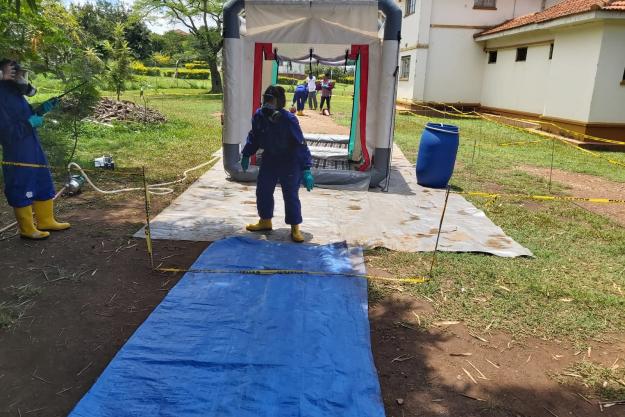
Participants at a training at the Uganda Rapid Deployment Capability Center (URDCC) in Jinja
THE HAGUE, Netherlands — 10 October 2019 — Emergency responders in East Africa gained hands-on experience in managing chemical incidents during an operational training at the Uganda Rapid Deployment Capability Center (URDCC) in Jinja, Uganda from 30 September to 10 October 2019.
Now in its fourth edition, the training teaches participants how to safely conduct critical emergency operations and support functions following an act of chemical terrorism or other toxic chemical release.
This year’s training marked an important milestone in the project, as the training was delivered by instructors from East Africa for the first time.
Lieutenant Colonel Matthew Edwards, UK Ministry of Defence Adviser to Uganda and Rwanda, congratulated the East African Community on their increased training capacity: “It is very impressive that the region now has a core of trained personnel who are training the next generation.”
Guy Valente, Programme Officer in the Assistance and Protection Branch of the Organisation for the Prohibition of Chemical Weapons (OPCW) noted: “The dependency on expertise from outside Africa has decreased so steadily since the programme started in 2016 that regional instructors are now leading the instruction. That has been our goal from the start.”
In closing the event, the Honorable Minister Aldolf Mwesigye of the Ugandan Ministry of Defense and Veterans Affairs thanked the OPCW, the United Kingdom and the Czech Republic for the combined “technical and financial support extended to the East African Community region in this area of capacity building.”
This training was organised by OPCW and the National Authority of Uganda, with the financial support of the government of the United Kingdom, and the technical assistance of the Fire Rescue Service of the Czech Republic.
Participants and instructors came from: Burundi, Kenya, Tanzania, and Uganda, and a representative from the Republic of Korea attended under the OPCW’s Assistance and Protection Instructor Exchange Programme.
Background
This training falls under the OPCW’s Assistance and Protection Training Cycles and the Programme to Strengthen Cooperation with Africa on the Chemical Weapons Convention — more commonly known as the Africa Programme.
As the implementing body for the Chemical Weapons Convention, the OPCW, with its 193 Member States, oversees the global endeavour to permanently eliminate chemical weapons. Since the Convention’s entry into force in 1997, it is the most successful disarmament treaty eliminating an entire class of weapons of mass destruction.
Over 97% of all chemical weapon stockpiles declared by possessor States have been destroyed under OPCW verification. For its extensive efforts in eliminating chemical weapons, the OPCW received the 2013 Nobel Peace Prize.
